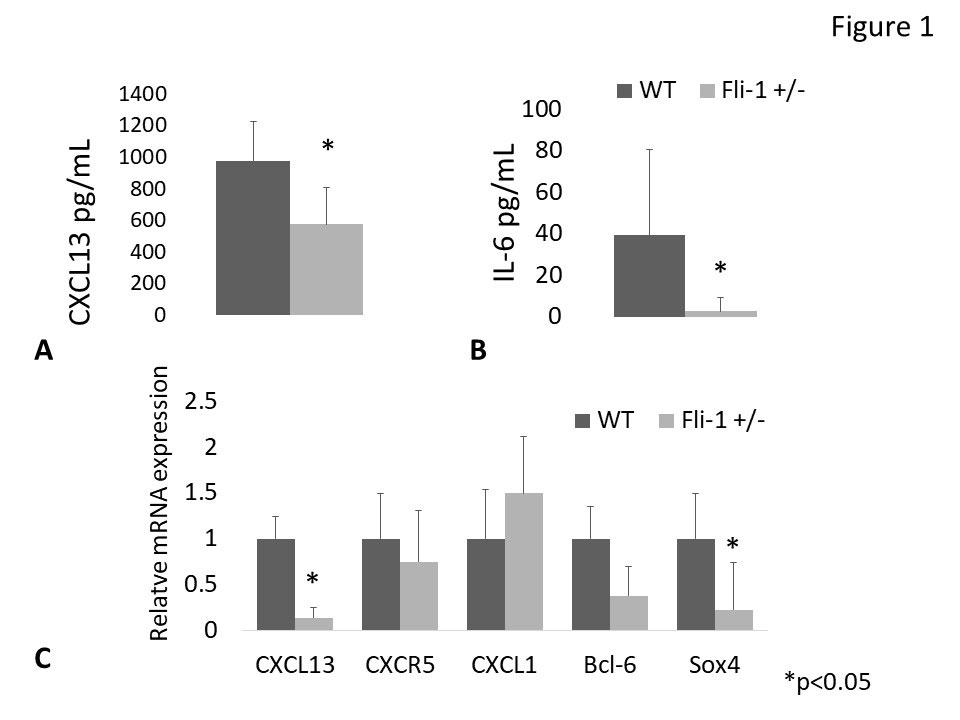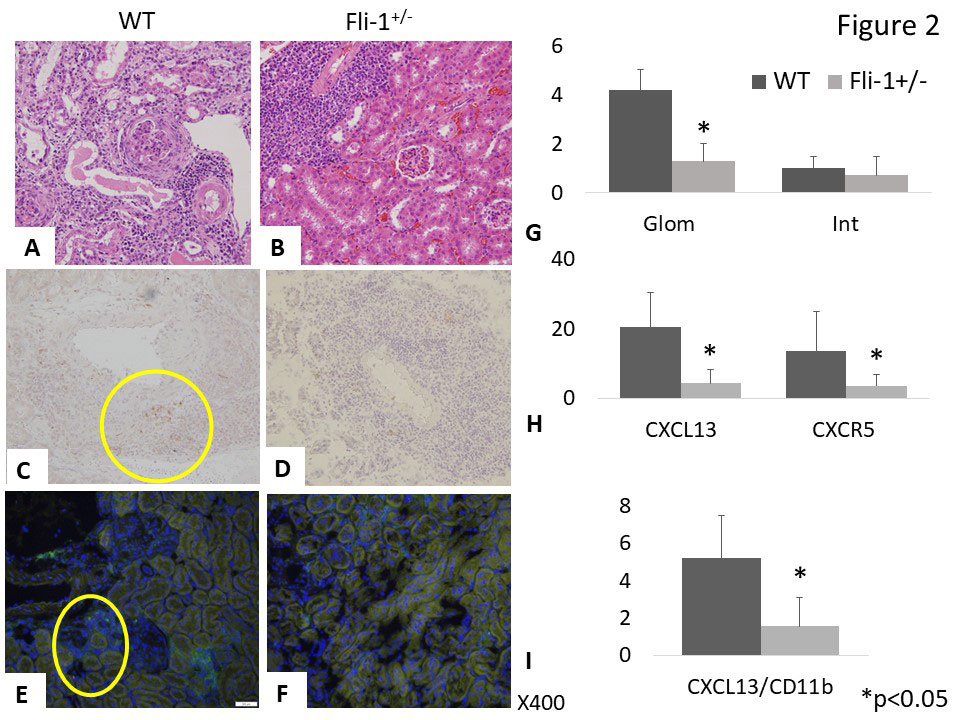Session Information
Session Type: Poster Session B
Session Time: 9:00AM-10:30AM
Background/Purpose: Friend leukemia virus integration 1 (Fli-1) belongs to the Ets family of transcription factors and plays an important role in the development of lupus nephritis. Previously, we have reported that Fli-1 regulates cytokine/chemokine expression (MCP-1, RANTES, IL-6, G-CSF, CXCL2, IL-17A, GM-CSF and CXCL10) and impacts immune cell infiltration into the kidney in lupus model mouse. CXCL13 is an important chemokine which promotes formation of ectopic lymphoid structures and has been reported to be associated with the pathogenesis of lupus nephritis. So far, the relationship between Fli-1 and CXCL13 is unknown. This study aims to elucidate whether Fli-1 impacts CXCL13 expression and contribute to the progression of lupus-like nephritis in adult MRL/lpr mouse.
Methods: Serum CXCL13 levels were measured in adult wild-type (WT, Fli-1+/+) MRL/lpr mice and Fli-1 heterozygote knockout (Fli-1+/-, homozygous knockout of Fli-1 results lethal in uetro) MRL/lpr mice (4-month-old or older) by ELISA. Renal mRNA expression (CXCL13, CXCR5, etc.) were measured using real-time PCR method. Kidneys were removed, stained and evaluated using pathology scoring system as previously described (Zhang et al. J Immunol 2004). Next, immunostaining using anti-CXCL13 or anti-CXCR5 antibodies were preformed and evaluated to compare the grade of CXCL13/CXCR5 positive immune cells infiltration (total number of positive cells in ten random high-power fields, Sato et al. Cells 2020). We also performed immunofluorescence staining by specific antibodies of CXCL13 and CD11b to detect infiltration of CXCL13/CD11b double positive immune cells.
Results: Serum CXCL13 levels were significantly lower in Fli-1+/- MRL/lpr mice than WT MRL/lpr mice (575 and 977 pg/mL, p=0.02) (Figure 1A). Serum IL-6 levels were also decreased in Fli-1+/- MRL/lpr mice. Renal expression of CXCL13 mRNA and Sox4 (an important transcription factor for B cell development) levels were significantly decreased in Fli-1+/- MRL/lpr mice (Figure 1C). Renal histology showed increased glomerular inflammation in WT MRL/lpr mice (Figure 2A,B,G). In contrast, the grade of interstitial inflammation was similar between the 2 groups (Figure 2G). In immunohistochemistry, the number of both CXCL13 and CXCR5 positive cells were significantly deceased in Fli-1+/- MRL/lpr mice compared to WT mice, despite similar interstitial immune cell infiltration into the kidney (Figure 2C,D,G,H). Furthermore, immunofluorescence staining showed significantly decreased CXCL13/CD11b double positive cells in Fli-1+/- MRL/lpr mice (n=5-7, p< 0.01) (Figure 2E,F,I).
Conclusion: Fli-1 impacts CXCL13 expression and affects lupus-like nephritis through regulating renal Sox4 mRNA expression, infiltration of CXCR5 positive cells as well as CXCL13/CD11b double positive immune cells into the kidney.
To cite this abstract in AMA style:
Sato S, Zhang X, Matsuoka N, Sumichika Y, Saito K, Yoshida S, Matsumoto H, Temmoku J, Fujita Y, Asano T, Watanabe H, Migita K. Transcription Factor Fli-1 Impacts CXCL13 Expression and Renal Inflammation in Lupus-like Nephritis of Adult MRL/lpr Mouse [abstract]. Arthritis Rheumatol. 2022; 74 (suppl 9). https://acrabstracts.org/abstract/transcription-factor-fli-1-impacts-cxcl13-expression-and-renal-inflammation-in-lupus-like-nephritis-of-adult-mrl-lpr-mouse/. Accessed .« Back to ACR Convergence 2022
ACR Meeting Abstracts - https://acrabstracts.org/abstract/transcription-factor-fli-1-impacts-cxcl13-expression-and-renal-inflammation-in-lupus-like-nephritis-of-adult-mrl-lpr-mouse/


